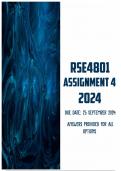, PLEASE USE THIS DOCUMENT AS A GUIDE TO ANSWER YOUR ASSIGNMENT
Please note that the author of this document will not responsibility for any plagiarizing you
commit.
1. For this assignment, you are required to write a research design and methodology chapter
informed by questions you responded to in previous assignment, which is Assignment 3.
Therefore, this chapter need to be structured in a specific way and cover key aspects of what
constitutes a research design and methodology chapter. The structure below is to be used:
Introduction
Research design
Research paradigm
Research approach
Research methodology
Research methods
Sampling techniques
Data organization and analysis
Ethical considerations
Ensuring the quality of the study findings
Conclusion
Assignment 3 Question - Option 1 - Academic Essay With No AI.
Introduction
This chapter outlines the research design and methodology employed to investigate learners'
perceptions of school discipline. Given the critical role that discipline plays in shaping the
educational environment, this study seeks to explore how students perceive the fairness,
effectiveness, and impact of disciplinary practices in their schools. The chapter details the research
design, research paradigm, approach, methodology, methods, sampling techniques, data organization
and analysis, ethical considerations, and the steps taken to ensure the quality of the study's findings.
Research Design
This study adopts a descriptive research design, which is appropriate for understanding learners'
opinions on school discipline without altering the environment in which the discipline occurs.
Descriptive research is often used to answer "what" questions, making it suitable for exploring the
perceptions of students regarding the disciplinary measures employed in their schools.
The primary goal of descriptive research is to systematically describe a situation or phenomenon. By
focusing on describing learners' perceptions and experiences, this study will help identify patterns
and trends in how school discipline is viewed, contributing valuable insights for improving
educational policies and practices.
Research Paradigm
The research paradigm guiding this study is positivism. Positivism is characterized by the belief that
knowledge is derived from observable phenomena, which can be measured and quantified. This
paradigm aligns with the survey research approach, which seeks to quantify learners' opinions
through structured data collection methods.





